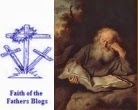Pope Saint Gregory the Great (also known as Gregory I; Gregory Dialogos; Father of the Fathers) was born in 540 A.D., at Rome, Italy. Saint Gregory is a Latin Father of the Church, and Doctor of the Church. He is also one of the four Traditional Doctors of the Latin Church (along with Saint Ambrose of Milan, Saint Augustine of Hippo, and Saint Jerome).
Gregory was the son of a wealthy Roman senator and Saint Silvia. He also was the nephew of Saint Emiliana and Saint Tarsilla, and the great-grandson of Pope Saint Felix III. Gregory was educated by the finest teachers in Rome. He was prefect of the city of Rome for one year, then he sold his possessions, turned his home into a Benedictine monastery, and used his money to build six monasteries in Sicily and one in Rome, and he entered the Benedictine Order, where he was a monk.
He was appointed cardinal-deacon, and then sent to the Byzantine court to secure aid against the Lombards. The result of his six year sojourn was a conviction that Rome must not rely on the East for help. After his return he saw English children being sold in the Roman Forum, and he wanted to become a missionary to England. The people of Rome would not allow him to leave. His desire was realized when he sent Saint Augustine of Canterbury, with a band of missionaries to England in 590.
Gregory was elected 64th Pope by unanimous acclamation on September 3, 590, and was the first monk to be chosen as pope. With his election to the papacy, he published a work on episcopal duties, which was used for centuries. He enforced the celibacy of the clergy, and supervised church funds.
He strengthened the prerogatives of the papacy by demanding supreme authority over all churches, judging bishops, and hearing the complaints of prelates. He established the system of appeals to Rome, and is recognized as an administrator and lawyer. Gregory collected the melodies and plain chant so associated with him that they are now known as Gregorian Chant. He also sent missionaries to France, Spain, and Africa.
Pope Saint Gregory the Great died of natural causes on March 12, 604 at Rome, Italy.
- "As for certain lesser faults, we must believe that, before the Final Judgment, there is a purifying fire. He who is truth says that whoever utters blasphemy against the Holy Spirit will be pardoned neither in this age nor in the age to come. From this sentence we understand that certain offenses can be forgiven in this age, but certain others in the age to come. "
Pope Saint Gregory the Great


